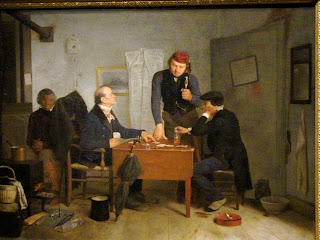 "My Kinsman, Major Molineaux":
"My Kinsman, Major Molineaux":Bumpkin Robin Discovers the Complexities of Town Life.

Or is this the village to which Ethan Brand returns?
PART TWO
So, as the artist makes self-centered, enlightening, courageous, impulsive, self-centered, self-destructive, egocentric, narcissistic decisions, the artist’s family and friends may have paid terrible prices—not always, I'm sure, but often. William Carlos Williams was a practicing physician, Wallace Stevens was a lawyer with an insurance company, and I’ve often wondered whether friends and relatives found them good human company, more stable—and altruistic?—than the “school” of Berryman, Plath, Hemingway, and a host of others. Banking didn’t seem to help Eliot much in his personal life. Maybe I'm grossly over-valuing what it means to look normal, hold down a steady job, to be in fact a professional. Am I the first?
Also, the same family, friends and social conventions may have been a cage, may have provided inane constraints and may have inflicted psychic wounds that half-created the young artist and sent him on his quest as much as his instincts and talent did. He might have been running from mundane demands or family pathology as much as he was running toward artistic expression and a defensible perspective on the world.
All of this is mostly likely a huge chicken and egg question. I’d be shocked to discover anything less than dozens of books on the subject, and maybe one day I’ll read some. What would I google? "Psycho Writer"? "The Dysfunctional Family and the Artist"?
For sparking all this, should Paula gets Comment of the Month, or does it just clinch the fact that Banjo has logorrhea? That’s a false apology. What I actually don’t understand is how so many people find questions like these boring, irrelevant, nerdy, especially when no one expects definitive answers—and especially compared to more manly, more exciting, mainstream problems like curing that slice at the Golden Parachute Golf Club, where the starboard rough is a genuine quagmire.
* *



















1 comment:
"Ethan Brand," and most of the rest of the Young Goodman Brown collection, is a damn fine story, and I miss teaching it.
I wonder if we've lost our appreciation for allegory. Many movies seem all archetypes, no realism, and much fiction seems the reverse. Hawthorne struck a rare and exquisite balance, enriched with a wry humor I could never get my students to appreciate.
Post a Comment